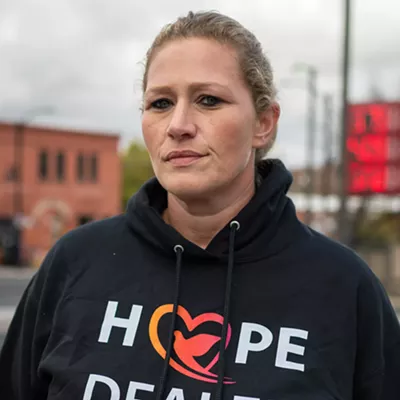Cities and counties could soon find themselves in charge of drug criminalization if Washington state lawmakers don't reach a deal on drug possession penalties before July 1.
For two years, the state has tested out lower penalties (making possession a misdemeanor instead of a felony) and required police to steer people toward treatment options during initial contacts. The pilot drug law was hastily crafted in 2021 after the state Supreme Court ruled the state's possession statute unconstitutional.
But even though lawmakers knew that their self-imposed sunset on the pilot was coming up this summer, the House and Senate failed to agree on how much to change or keep the same before the session ended April 23. While negotiations continue, places like Spokane and King County have already started the process of passing local rules against public drug use.
In the House, Democrats pushed to keep possession a simple misdemeanor, while the Senate passed a bipartisan bill making possession a gross misdemeanor punishable by up to a year in jail with the opportunity to drop charges and convictions if people successfully complete treatment.
House Republicans negotiated with Senate Democrats and Republicans through the final hours of the session. But outgoing House Minority Leader Rep. J.T. Wilcox, R-Yelm, says that the conference committee that tried to reach a compromise did not come out with the expected deal.
"The thing for me that is the most frustrating is there was such a clear path they'd already done in the Senate," Wilcox says. "Three of the four caucuses seemed to arrive at an alternate path, so why they chose the one that was the least likely to pass and then pretended it was a huge surprise when it failed, I cannot understand."
Rep. Peter Abbarno, R-Centralia, who worked on a compromise with Senate leaders, says that House Democrats didn't reach out to negotiate.
"There was a lack of communication and collaboration towards the end regarding how we could get something done in a bipartisan manner, because that's what we're hoping for," Abbarno says.
One of the sticking points for Republicans was a section that would preempt local rules for the siting of harm reduction facilities such as opioid treatment programs and needle exchanges. The preemption would eliminate the required public meeting before a program can move into a community, and prevent local governments from putting more restrictions on those programs than they put on other public facilities.
"I understand there's some reticence to siting of facilities and there's always that NIMBY mentality that happens, but for any treatment to be successful you need local buy-in," Abbarno says.
Wilcox says Republicans aren't all against programs like needle exchanges, but they believe local governments should have a say in their regulation.
In fact, Wilcox says that local control of drug possession in general could be better than a bad statewide compromise. Much of the new treatment funding wasn't tied to the bill.
"I don't think that no bill is the best-case scenario, but it's not the worst-case scenario either," Wilcox says. "No bill means that local governments will be free to impose their own punishments up to gross misdemeanors."
Senate Majority Leader Andy Billig, D-Spokane, says there's bipartisan agreement that drug possession should be a criminal offense, and the state should treat addiction as a health problem. He believes lawmakers can find a compromise in coming weeks and update the law during a special session, avoiding a scenario where possession penalties depend on what side of the street you're on.
"Addressing drug possession on a statewide basis is a much better solution," Billig says. "If each city and county makes their own laws it will be very confusing for citizens." ♦
























